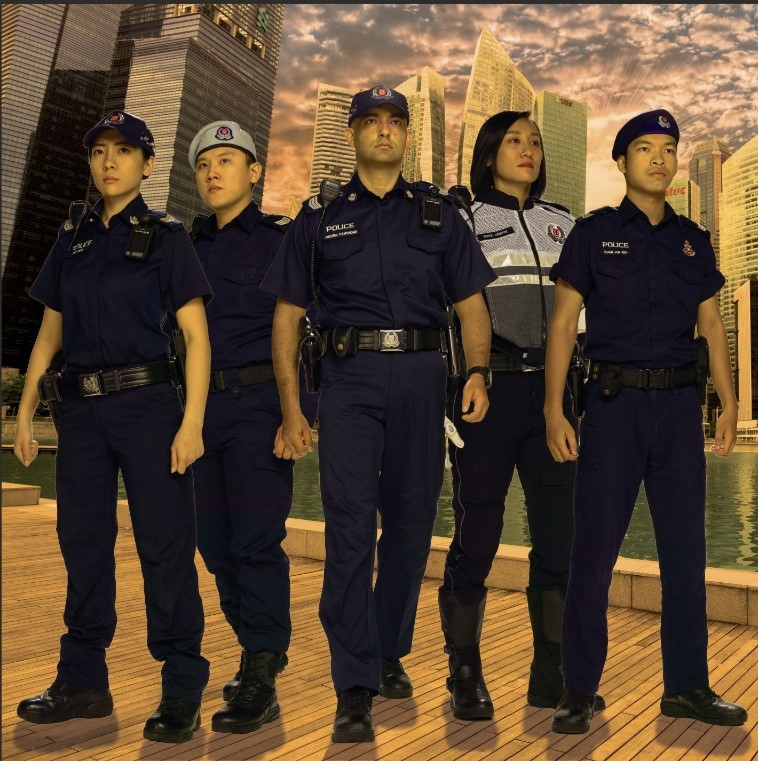- Police Officer
- The Protectors
- Career Roadmap
- Direct-Entry Inspector
- Direct-Entry Sergeant
- Scholarships and Awards
- Civilian Officer
- General Information
- Home Affairs Senior Executive
- Extended Management Executive Officer
- Language Executive Scheme
- Commercial Affairs Officer
- Home Team Specialist Scheme
- Technical Support Officer
- Volunteer Schemes
- Community Watch Scheme
- Episodic Volunteering Programme
- SPF Boards and Councils
- Volunteer Special Constabulary
- Volunteer Special Constabulary Community
- Victim Care Cadre Programme
- National Police Cadet Corps Inspectors and Honorary Officers
- Citizens on Patrol
The Volunteer Special Constabulary (VSC) is made up of volunteer citizens and permanent residents (VSC officers) who support the regular ranks in the Singapore Police Force. VSC officers are posted to one of the seven Police Land Divisions or a specialist unit:
- Airport Police Division
- Police Coast Guard
- Public Transport Security Command
- Traffic Police
Subsequent postings may include units like Police Operations Command Centre, Training Command, Criminal Investigation Department and Central Narcotics Bureau, where sufficient ground exposure and good work performance are essential pre-requisites.
What Does a VSC Officer Do?
As a VSC officer, you are expected to serve a minimum of 16 hours a month and perform duties such as operations at major events, patrol, roadblocks and checks, coastal vehicular patrol (Police Coast Guard) and mobile patrol and escort duties for VVIPs (Traffic Police). The position is voluntary but you will receive duty allowance of S$5.20 per hour.
Who Can Be a VSC Officer?
You must be a Singapore Citizen or Permanent Resident between 18-45 years of age and have attained a minimum of 5 GCE 'O' levels credits or NITEC. Males must have a PES status of A or B1 and must have fulfilled their National Service obligations. You must also undergo six months of non-residential training on:
- Basic legal knowledge
- Policing procedures
- Police contact tactics (PCT)
- First aid
- Use of firearms
The training is conducted three times a week: twice on weekday evenings and once on weekends (Saturdays).
How to Apply to Be a Volunteer Special Constable
Click here to apply. Have your Singpass App ready for authentication.
1. Are VSC officers covered by insurance?
Yes, all VSC officers are covered under a group corporate insurance plan as well as workmen’s compensation for injuries sustained during duties.
2. Can I re-apply after my unsuccessful application?
You must satisfy the minimum requirements before a re-application will be considered. The VSC Recruitment Department may invite applicants to re-apply on a case by case basis.
3. Can I apply for Regular Officer posts based on my VSC application?
No, a fresh application must be made for a Regular Officer position. Some of the minimum requirements for a Regular Officer position differ from that of a VSC. There will be no exemption from the Regular Officer’s basic training course even if you have completed the VSC basic training.
4. Will I be considered if I’m pending or still serving National Service?
Those who are serving Full-time National Service or are waiting to be enlisted will not be considered.
5. Do VSC officers have any welfare benefits?
VSC officers are eligible to participate in most welfare activities offered by the Police Welfare Division.
6. Can active Auxiliary Police Force/Immigration and Customs/Prison/SAF Officers join VSC?
Yes, but they would need to have clearance from their organisations/supervisors.
7. What rank will I get when I graduate from HTA?
Generally, new VSCs will receive the rank of Sergeant 1 upon successful enrolment. Subject to approval, former regulars/PNSFs may be allowed to retain their last-held rank.
8. Is IPPT compulsory for VSC officers?
Yes, IPPT is compulsory. However, a VSC officer who is an existing Regular Uniformed Officer in a uniformed organisation, such as SCDF/S/PNSF/ICA/Prisons, is exempt from VSC IPPT if they can produce the original IPPT results taken at their respective agencies in the same year. All VSC officers must pass the annual shooting test and the Police Contact Tactics (PCT) test.
9. How do I apply for leave if I cannot attend any of the training courses after enrolment?
You are able to defer training if you are unable to commit due to your current schedule and responsibilities. To defer training, apply for leave in writing, indicating the reason to the Basic Training Officers (VSC) at Training Command.
10. Is minimum attendance required for the VSC training?
An 85% attendance is necessary before you are allowed to sit for the Basic Training Final Exam.
11. What are the components of the training that I need to pass?
The components that you will need to pass are: a) Foot Drills b) Basic First Aids c) Shooting d) IPPT e) Police Contact Tactics (PCT) f) Basic Police Law and Procedures
12. Can I resign from or take leave during my appointment as a VSC?
Yes, you may. There is no bond or minimum years of service with VSC before resigning. However, you will be asked to attend an exit interview with the Head VSC of the Division. Alternatively, you can choose to take an extended leave of absence, which can vary from one month to a maximum of one year.


